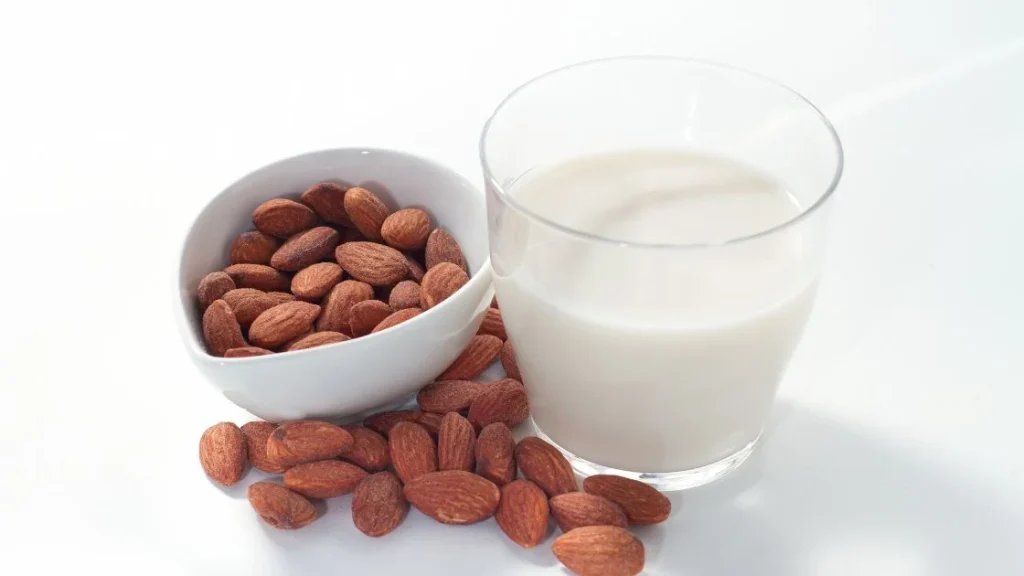Almond milk has been around for centuries, with evidence of its use dating back to medieval
times. This milk has become an increasingly popular alternative to dairy in recent
years, particularly among those of you looking for a plant-based option.
But, what exactly is almond milk?
You’ve guessed it – it is an alternative to dairy products, made from crushed almonds and water. It’s a creamy, nutty, and slightly sweet alternative to cow’s milk, but with a similar consistency and versatility.
Compared to other milk alternatives like soy, rice, or oat milk, almond milk also has a unique taste and texture. It’s also a great option for those with lactose allergies or intolerances. Just keep in mind that you should avoid almonds if you have a nut allergy. Let’s take a deeper look at some of the health benefits of almond milk, and how to make almond milk at home.
Benefits of Almond Milk

Almond milk is a nutrient-rich plant-based milk that offers numerous health benefits. Here are some of the top benefits of including almond milk in your diet:
- Low in calories and high in nutrients: Almond milk is lower in calories than dairy, with just 30-50 calories per cup, (depending on the brand). It’s also high in nutrients like vitamin E, which is essential for healthy skin and hair, and calcium, which is important for strong bones.
- Contains heart-healthy fats and antioxidants: It is a good source of healthy fats, including omega-3 and omega-6 fatty acids, which can help lower cholesterol levels and reduce the risk of heart disease. It’s also rich in antioxidants, which help protect your body from damage caused by free radicals.
- May aid in weight management and digestion: This is a great option for those looking to manage their weight or improve their digestion. It’s lower in calories than cow’s milk and contains more fiber, which can help keep you feeling full and satisfied. Plus, it’s naturally lactose-free, making it easier to digest for those with lactose intolerance.
- Overall, almond milk is a nutritious and delicious alternative that can provide a range of health benefits. Whether you’re looking to manage your weight, improve your digestion, or simply enjoy a tasty beverage, almond milk is a great option to consider!
How to Make Almond Milk
Making your own almond milk is a fun and easy process that allows you to customize the flavor and consistency to your liking. Here’s an easy step-by-step guide to making homemade almond milk:

Ingredients:
- 1 cup raw almonds
- 4 cups water
- Sweetener (optional)
Instructions:
- Soak the almonds overnight in water. This will help soften them and make them easier to blend.
- Drain and rinse the almonds. Add them to a blender along with 4 cups of water.
- Blend on high speed for about 2 minutes or until the mixture is smooth and creamy.
- Strain the mixture through a nut milk bag or cheesecloth, squeezing out as much liquid as possible.
- If desired, sweeten the milk with honey, maple syrup, or even dates to taste.
Tips:
- For a creamier consistency, use less water. Inversely, for a thinner consistency, use more water.
- To customize the flavor, try adding vanilla extract, cinnamon, or cocoa powder.
- Don’t throw away the leftover almond pulp. It can be used in recipes like smoothies, baked goods, or energy bites.
- By following these simple steps, you can make your own delicious and nutritious almond milk at home. Plus, you’ll have the added satisfaction of knowing exactly what’s in your milk and the opportunity to experiment with different flavors and textures.
Almond Milk in Cooking and Baking
Almond milk is a versatile ingredient that can be used in a variety of recipes. Here are some ideas for incorporating almond milk into your cooking and baking:
- Smoothies: Almond milk is a great base that provides a creamy texture and a subtle nutty flavor. Try blending almond milk with frozen fruit, greens, and a scoop of protein powder for a delicious breakfast or snack.
- Oatmeal: Use almond milk instead to cook your oatmeal for a dairy-free and plant-based option that also contains fewer calories. Add your favorite toppings like berries, nuts, and a drizzle of honey for a hearty and satisfying breakfast.
- Baked Goods: Almond milk can be used as a substitute for milk in baked goods like muffins, cakes, and pancakes. It creates a moist and tender texture, and its nutty flavor complements many types of baked goods.

Advantages of Using Almond Milk in Cooking and Baking
- Dairy-free: Almond milk is a great alternative to dairy milk for those who are lactose intolerant or have a dairy allergy.
- Low in calories: Almond milk is lower in calories than dairy milk, making it a great option for those looking to manage their weight.
- Nutritious: It is rich in vitamins and minerals like vitamin E, calcium, and magnesium, providing important nutrients to support overall health.
Buying and Storing Almond Milk
Almond milk is widely available in grocery stores, but not all brands are created equal.
Here are some tips for selecting high-quality store-bought almond milk:
- Check the ingredient list: Look for brands that use simple, wholesome ingredients, such as almonds, water, and a natural sweetener like dates or honey. Avoid brands that contain additives like carrageenan, which has been linked to digestive issues.
- Choose unsweetened: Opt for unsweetened almond milk to avoid excess sugar and calories.
- Look for fortified options: Some brands fortify their almond milk with additional nutrients like calcium and vitamin D, which can be beneficial for bone health.
Guidelines for Storing Almond Milk Properly to Prolong its Shelf Life
- Check the expiration date: Always check the expiration date before buying almond milk and choose the freshest option available.
- Refrigerate after opening: Once opened, almond milk should be stored in the refrigerator and consumed within 7-10 days.
- Avoid freezing: While almond milk can technically be frozen, it may separate or develop an icy texture, so it’s best to avoid freezing it if possible.
- Almond Milk Is All That!
Almond milk is a nutritious and delicious plant-based alternative to dairy milk that offers a range of health benefits. It’s low in calories, high in nutrients, and contains heart-healthy fats and antioxidants. Whether you make your own or buy it at the store, almond milk is easy to incorporate into your diet and can be used in a variety of recipes!
If you’re looking to try almond milk for the first time, be sure to select a high-quality brand with simple ingredients and avoid those with added sugars or additives. So, go ahead and give almond milk a try! With its delicious nutty flavor and versatile uses, it’s sure to become a staple in your plant-based diet.









